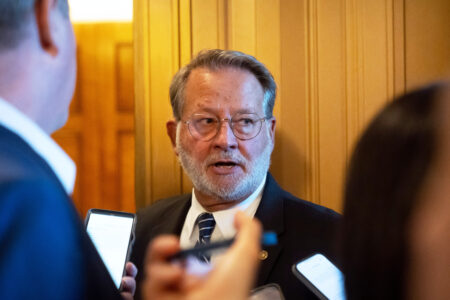Senate Democrats hold out for health care
WASHINGTON (AP) — Senate Democrats rejected for the 10th time Thursday a stopgap spending bill that would reopen the government, insisting they won’t back away from demands that Congress take up health care benefits.
The vote failed on a 51-45 tally, well short of the 60 needed to advance with the Senate’s filibuster rules.
The repetition of votes on the funding bill has become a daily drumbeat in Congress, underscoring how intractable the situation has become. It has been at times the only item on the agenda for the Senate floor, while House Republicans have left Washington altogether. The standoff has lasted over two weeks, leaving hundreds of thousands of federal workers furloughed, even more without a guaranteed payday and Congress essentially paralyzed.
“As we are positioning as two sides that are seemingly dug in on this 16th day of a shutdown, real people are wondering is their government going to be there for them?” said GOP Sen. Lisa Murkowski of Alaska.
The shutdown is on track to become the second longest, surpassing the 16-day closure in 2013, which was also a debate over the Affordable Care Act. The longest ended in 2019, after 35 days.
While the military was paid this week, it’s unclear how long that will last. The White House budget office told Congress that it cost $6.5 billion to cover this one pay period. The next one is two weeks.
Democrats say they won’t budge until they get a guarantee on extending the tax credits for the health plans. They warn that millions of Americans who buy their own health insurance — such as small business owners, farmers and contractors — will see large increases when premium prices go out in the coming weeks. Looking ahead to a Nov. 1 deadline in most states, they think voters will demand that Republicans enter into serious negotiations.
Some Republicans have acknowledged that the expiration of the tax credits could be a problem and floated potential compromises to address it, but there is hardly a consensus among the GOP.
House Speaker Mike Johnson, R-La., this week called the COVID-era subsidies a “boondoggle.”
President Donald Trump has said he would “like to see a deal done for great health care,” but has not meaningfully weighed into the debate.
If Congress were to engage in negotiations on significant changes to health care, it would likely take weeks, if not longer, to work out a compromise.




